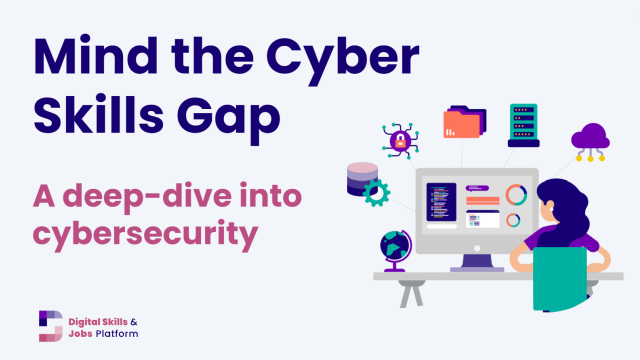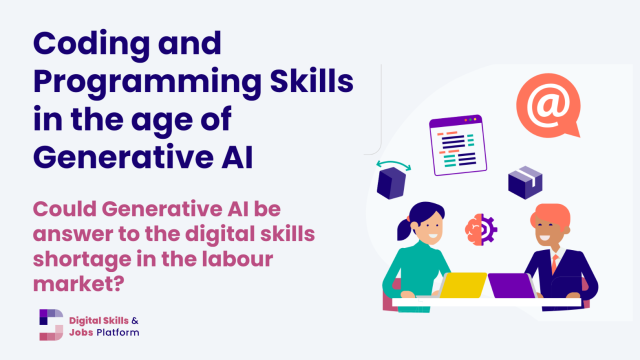Digital Jobs: a deep-dive

Summary
The impact of digitisation on life and the world of work in our society has led to the emergence of digital jobs, a reflection of changing trends and needs in the labour market. The variety of jobs where digital technology plays a main role is constantly growing as more and more activities rely on Information and Communication Technologies (ICTs) to improve results and efficiency. The concept of digital jobs ranges from those intensive in technology (e.g., programmers or digital artists) to the more traditional ones that have incorporated digitisation to some extent (e.g., accountants or delivery drivers). Somewhere in the middle, we can find hybrid jobs: where specific specialisation in a field is complemented by relatively advanced digital skills (e.g., stockbrokers, marketing executives, accountants using digital software, etc). This diversity of digital jobs opens up a whole world of opportunities for people anytime they upskill, i.e. improve/develop digital skills to perform the tasks the job requires. The EU has developed labour classifications like ESCO, the European Skills, Competences, Qualifications and Occupations framework, and specific references like the e-Competence Framework, which provide common terminology and descriptions of digital jobs and ICT professional roles, thus making labour market clearer and understandable across Europe.
About the author
Luis has a BSc and MSc in Informatics from the Universidad Politécnica de Madrid (UPM) since 1989. He earned his PhD with extraordinary award from the University of Basque Country in 1997. He has served as interim associate professor at UPM (1989-1996), aggregate professor and head of department at Universidad Europea de Madrid (1996-2008) and associate professor at Universidad de Alcalá (since 2008). He was the CEO of an ICT service-oriented SME (2002-2006) and has acted as freelancer consultant for big companies. Luis has been a board member of CEPIS (2011-13, 2016-2020), and as of 2022 he is CEPIS’s president. Over the years, he has helped to shape the development of EU reference frameworks for digital skills and employment. Luis has actively contributed as an official expert to the development of the three main references in the area: the ESCO labour classification for ICT services, the European standard of e-competences for ICT professionals EN6234-1:2019 and DigComp, the Digital Competence Framework for Citizens.
Introduction
The digital world already touches almost every part of our lives, and this trend is getting bigger and bigger. While it is hard to predict what will happen next, one fact remains true: demand for jobs that require digital skills and competences is growing fast (Mandl, 2021). Even occupations traditionally far from technology are increasingly incorporating technology in their daily and basic activities (e.g., truck and taxi drivers are now constantly using guiding systems with GPS, apps for managing reservations and delivery plans, etc). Digitisation is imposing a general change of paradigm in the type of roles and jobs that companies and organisations demand from employees, even much greater than other contemporary trends such as internationalisation (Schmerber et al., 2021), or environmental and sustainability aspects (CEDEFOP, 2021).
We can consider digital jobs as those, where application of information and communications technologies (ICT) to a new or existing activity or process is essential, although other skills can also be crucial.The World Bank (2018) considers anyone that “uses digital technology or is made possible by such technology” a digital worker. So, these digital jobs can be found in large corporations, small and medium enterprises (SMEs), non-government organisations (NGOs) and government and public entities as these organisations adopted ICT in their existing operations to become more effective and efficient.
Others tend to focus on ICT-jobs (Folea, 2019), those very intense in digital activity or exclusively existing in digital and media companies, and easier to categorise by official statistics, e.g. as regularly done by Eurostat. That is the reason why, at the beginning, people may think these types of jobs only appear in the digital sector, the companies related to media, technology, digital marketing, and so on. However, as digitisation now pervades every area of life, digital jobs appear across all industries and sectors.
Basic definitions: occupation, job, and role
When describing the job market, it is relevant to firstly clarify a few terms to avoid possible confusion. These terms are ‘job’, ‘occupation’, and ‘role’. Although there are many different definitions for these terms, we prefer to adopt the terminology provided by the ESCOpedia, the online reference to the official EU ESCO labour classification:
“An occupation is a grouping of jobs involving similar tasks and which require a similar skill set. Occupations should not be confused with jobs or job titles. While a job is bound to a specific work context and executed by one person, occupations group jobs by common characteristics.”
A "job" is a specific position you hold within an organisation. The following example can clarify better the concepts: “Being the database administrator for the online job ads in the JobHunter portal” is a job. “Database administrator”,“database specialist” or “IT engineer” could be occupations, i.e., groups of jobs to which this job belongs. Occupations can be used as job titles. An employer recruiting for the above-mentioned position can title the vacancy with the name of an occupation, e.g., "database specialist".
In the end, a "job title" describes someone's specific job or position, like "urologist", whereas an occupation refers to a broader title or the entire field or sector in which someone works, like "doctor." Many people can share the same occupation without sharing the same job title. For example, "IT developer" is an occupation, but there are many different types of developers, like those specialised in videogames and the ones for mobile apps.
A "role" derives from an organisational need to get something done (CEN/CENELEC, 2018). It is an organisational requirement that can be met by assigning employees to carry out all or part of the tasks required to ensure that role is carried out. One person or team may develop multiple roles as part of their job: e.g., one IT manager will act in the role of IT project manager, IT systems analyst and even as software developer.

Types of digital jobs
Given the huge and constantly widening range of possible jobs where digital technology is essential for performing activities and for achieving goals, it is possible to consider different types of jobs depending on their nature and origin. Attempts to categorise digital jobs tend to use intensity in the use of ICT as the main criterium (Kluzer et al., 2020). We can think of three sample categories of digital jobs (World Bank, 2018) as shown in Table 1 below, with examples taken from the ESCO classification of labour.
Category of digital jobs | Description | Sample ESCO occupations |
ICT-intensive jobs | Directly focused on ICT, they cannot exist without the corresponding digital services, products, or technologies | |
ICT-dependent jobs | Use digital technologies to varying degrees and made possible by digital technology but still having a relevant proportion of essential skills from other disciplines | Stockbroker,call centre analyst, travel agency manager, etc. |
ICT-enhanced jobs | Use digital technologies to varying degrees but could still be performed without technology with lower performance or quality | Graphic designer, accountant, shipping agent, etc. |
Table 1. Categories of digital jobs linked to examples in ESCO
These categories may often overlap. Most ICT-enhanced jobs are traditionally performed in offices or other standard workplaces but now enhanced by digital tools like word-processing, spreadsheets, etc. Jobs subcontracted and/or carried out online are technology dependent: they could not happen without the digitisation and many times they require specialised applications or hardware, e.g., 3D design, financial analysis, etc. Of course, ICT-intensive jobs can also appear as distance work like programmers or website developers acting as freelancers. In general, online platforms or mobile apps do not necessarily create new jobs or require advanced digital skills but they enable offering on-demand services (e.g., food delivery) or internationalize offer of products and services for small producers (e.g., using online retailing platforms like Amazon).
ICT-intensive jobs
The first category of jobs has emerged with the development of new services and products almost completely based on digital technology, frequently placed in the digital and media industry or sector. For example, digital videogames designers and developers are only needed if you have consoles available to the public as a form of entertainment. Some of these jobs can be considered as specialisations of other technology jobs: digital videogames designers and developers can be seen as application developers and designers with a relevant and strong specialisation in the field of games. ICT professionals do not only need digital skills but also other non-ICT skills or domain-specific knowledge, e.g., on insurance, banking, or health if they work for organisations in those sectors. Other jobs like digital artist or digital community manager not initially linked to ICT professionals also enter in this category.
ICT-dependent jobs
The category of ICT-dependent jobs is also frequently named as hybrid jobs (e.g., advisor in cryptocurrencies) as they merge relevant qualified work (e.g., finance and investment skills) with specialised digital knowledge (e.g., block-chain and algorithms). They frequently break the traditional divisions of disciplines to decide who is trained or qualified to develop the activity. For example, a biotechnologist can be frequently a biologist with extensive training and skills in ICT technology or sometimes an ICT engineer with specific additional education in biology. Another example could be a librarian at present time who has to increasingly work with digital documents and resources while keeping paper format books and managing digital subscriptions to newspapers, multimedia, etc. These hybrid digital jobs could be very varied as there are many combinations of traditional disciplines with specialisations in digital technology, although probably each of the combinations does not frequently accumulate large number of available positions. However, these very specialised jobs are well considered and paid given their specialisation and scarcity of available candidates.
ICT-enhanced jobs
The final category includes those jobs that have existed for a while that have been, more or less, extensively digitised. As we mentioned before, delivery drivers have existed for decades and they have been changing work methods according to the advances of technology, e.g., starting with radio systems for communication, then having more and cheaper options with analogic mobile phones and now using smartphones, tablets, or consoles, connected to mobile data networks, GPS guidance and tracking, etc. Obviously, digital technology has enabled cheaper, faster, and more trustworthy delivery services, which in turn have boosted the size of the demand and the opportunities for business. In this case, drivers obviously have added digital skills now essential to their other previous necessary skills, like the ability to drive. The nature of the work is similar as it was in the past, even can be still performed without digital technology, but now it is transformed and made more efficient via digital technology.
The importance of terminology and frameworks
The rapid evolution of technology and the growing presence of digital jobs in organisations as the digital transformation advances in all fields, is bound to create a feeling of confusion in many people, even in professionals. Names and acronyms of technologies, brands of tools and systems, titles of positions or occupations, or even personal qualification certifications appear and disappear or are simply renamed, for communication purposes for example. Moreover, industry and researchers are constantly devising new methods and tools, making obsolete in few years what was demanded, trendy and in the cutting edge of technology.
This situation is neither helpful for guiding employers and candidates to jobs, nor when it comes to analysing the job market. Fortunately, EU has made a big effort in providing homogeneity and consistency to the labour terminology for skills and occupations through ESCO. It is the European multilingual classification of Skills, Competences and Occupations that works as a dictionary, describing, identifying, and classifying professional occupations and skills relevant for the EU labour market. The ESCO classification has 3,008 occupations and 13,890 skills linked to these occupations, translated into 27 languages (all official EU languages plus Icelandic, Norwegian and Arabic). This common terminology is already helping to the successful integration of refugees in the EU, has enabled advanced tools for labour market intelligence (like OVATE), etc.
In the case of digital jobs, for example, ESCO offers a standardly-accepted terminology for the typical ICT professionals (occupation group 25) such as software and application developers and similar occupations, for example:
- ICT System Analysts: they translate the needs of software users into technical specifications.
- Computer Vision Engineers: they apply advanced techniques to solve problems such as autonomous driving, digital image classification, medical image diagnosis, etc.
- Data Analysts:they prepare, organise, validate, and interpret large datasets to generate visualisations and interpretations for decision makers.
There are other groups linked to ICT occupations like:
- ICT Technicians (group 35) like webmasters, who are responsible for contents and technical work of a website, or ICT helpdesk agents who assist users, answer their questions or solve their computer problems.
- ICT Service Managers (subgroup 133): CIOs (Chief Information Officer), the top managers in ICT, and ICT Project managers, responsible for success of projects.
- ICT Sales Professionals (subgroup 2434) such as, e.g., ICT presales engineers: they work with the sales team and provide technical guidance to plan and modify product ICT configurations to meet client requirements.
The ESCO classification clearly describes each occupation with a standard recommended profile of knowledge and skills. For example, the ICT Project Manager description lists some their functions, e.g., “schedule, control and direct the resources, people, funding, and facilities to achieve the objectives of ICT projects” and recommends some essential skills such as “provide cost benefit analysis reports”, “manage staff” or “perform risk analysis” among a good number of others.
Of course, ESCO also describes other intensive digital jobs not strictly linked to the ICT sector: for example, digital artist, online community manager, or digital media designer. One example of description of this category of jobs is the one for digital prototyper: “Transform paper pattern into digital form using special computer software. They operate and monitor machines which make different products related to clothing”.
Of course, traditional jobs highly transformed by digitisation as, e.g., the above-mentioned example of the car or van delivery driver (occupation 8322.2) are also included, and they require typically digital skills such as “solve location and navigation problems by using GPS tools” or even knowledge like “data protection”.
Other frameworks
Other frameworks can also help us understand the roles and competences required by the labour market from those working with digital technologies, mainly ICT professionals - but also others with intensive use of digital technology.
The e-Competence Framework (e-CF) sets forward 41 e-competences that describe all possible types of ICT professional work, offering a common language for competences, skills and proficiency levels across Europe. ICT professionals may act in five main areas of work, each connected to a set of skills:
- Planning – conceptualising, designing, or decision-making on ICT solutions
- Building - Developing and implementing systems and applications;
- Running – Delivering, supporting, operating, and maintaining systems and infrastructure;
- Enabling – Setting up the right conditions for ICT-related professional activities;
- Managing – Operating and ensuring that resources and processes are ready and available for ICT professionals.
Translating the e-CF framework into reality
As part of their job, an ICT professional working for a company may need to ensure that the current ICT infrastructure corresponds to identified or new business needs (competence A.1 Information Systems and Business Strategy Alignment) and sometimes may provide solutions to extract valuable information from large quantities of rough data to address business goals (competence D.7. Data Science and Analytics). If a new digital solution is designed and piloted, an ICT expert needs to analyse its current features and determine whether the tool fulfils what was requested (Competence B.3. Testing). To ensure business continuity, an ICT professional has to maintain existing systems and monitor whether they work correctly, and whether they are still fulfilling their function (Competences C.5. Systems Management, or E.6. ICT Quality Management).
In the real world, these activities are performed at specific proficiency levels, depending on the extent to which the ICT professional is capable to perform the required tasks. The standardised framework reflects this. For example, to cover Level 1 proficiency, an ICT professional would simply need to follow predefined protocols to maintain operating systems. In contrast, to cover Level 5, an ICT expert must have competence in planning strategic solutions on a much higher level.
When applying the competences, ICT professionals frequently need to exploit skills and knowledge to achieve the best results: e.g., for e-competence D.10. Information and Knowledge Management, they need to know “legal regulations (IPR, GDPR)” (knowledge K5) and be capable of translating/reflecting business behaviour into structured information (skill S3).
Based on this standard there are other documents that are useful to define relevant aspects of professional activity with ICT. For example, the standard EN16234-1 also defines 30 professional roles in ICT: e.g., DevOps Expert, Systems Architect, Network Specialist Role or Information Security Manager role. Each of these 30 roles has a recommended set of e-competences with their corresponding level of proficiency.
The e-CF is now used by multinationals and big organisations in the EU like La Poste Italiane, Airbus or Tata Steel among other examples and it is also gaining presence in other contexts like academia and training. Moreover, there are more use cases where the e-competences reference are used to define more roles: for example, (CEN/CENELEC, 2022) defines a profile of “web content author”, a digital job role, responsible for producing effective accessibility content, both text and multimedia, for a website (see the e-CF profile in Table 2 below).
e-Competence | Short description | Proficiency level |
C.3. Service Delivery | Ensures proper service delivery analysing data and reporting incidents | ◊ ◊ (L2) |
D.6. Digital Marketing | Uses analytical tools and assesses user engagement and effectiveness of website | ◊ ◊ ◊ (L3) |
E.4. Relationship Management | Manages simple multi-stakeholder, multi-disciplinary relationships. | ◊ ◊ ◊ (L3) |
E.6. ICT Quality Management | Evaluates quality indicators and processes and proposes remedial actions | ◊ ◊ ◊ (L3) |
Table 2. E-CF profile of the role "web content author"
The basis of EN16234-1 has also recently enabled the development of additional elements to better define jobs and other complementary aspects like the definition of a body of knowledge of professional ICT, guidelines for developing ICT curricula for professional training, an ethics framework for ICT profession, etc.
Demand of candidates for digital jobs
The analysis of labour market is complex and forecasting exactly what will happen in the future is always a hard exercise. It is easier to identify the traditional ICT professional workforce. Eurostat regularly offers statistics on the number of ICT Specialists in the EU as part of the Human Capital section of DESI (Digital Economy and Society Index). In 2021, there were 9 million ICT specialists in Europe, representing 4.3% of total employment. Women were still largely underrepresented, counting for less than 20% of the total ICT workforce (DESI 2022). From the ICT specialists already employed, a little more than half (64.5%) have studied computer science in university. This means there is a lot of room for those without a formal level of education, but with specific digital training and skills. The European Centre for the Development of Vocational Training, CEDEFOP estimates that around 560,000 ICT Technicians and 1,421,000 ICT professionals will be needed in Europe for the period 2020-2030. The European Commission’s Digital Compass was launched to respond to this need, presenting a high-level vision on how to make the next decade digital and European – by setting a target for 20 million ICT specialists in the EU by 2030.
These figures go even deeper. The EU has developed labour classifications and reference frameworks that enable advanced collection of data across multiple dimensions from the job market. With this common and complete terminology, it is possible to exploit big data through natural language processing and AI. The OVATE tool of CEDEFOP offers detailed information on the jobs and skills employers demand based on millions of online job advertisements (OJAs), collected from various sources (like private job portals, public employment service portals, recruitment agencies, online newspapers, and corporate websites) in 28 European countries. All information is then mapped to the occupations and skills of the ESCO labour classification.
Data from the OVATE tool for 2021 (see graph below) can help us analyse the demand for different groups of occupations. As the figure shows, demand for ICT professionals stands at 8.2%, and 1.25% of all online job advertisements concerned ICT technicians, meaning that over 10% of all online job advertisements in 2021 required high ICT intensity, and consequently, tech skills.

Figure 1. Online job ads demanding ICT specialists in Q1 2021 – Q4 2021 in the EU
Data extracted from OJAs can help to understand the demand for digital skills on all other occupation categories, alongside the ongoing digitalisation of the world of work.

Figure 2. Percentage of job ads mentioning each general digital skill in Q1 2021 – Q4 2021 in the EU
As Figure 2 shows, general digital skills are needed for most jobs, with competences like ‘working with computers’, basic ‘ICT’ knowledge, and ‘Information skills’ considered most in demand. There are also mentions to more specific skills (in demand to a lesser extent) such as the ability to use digital tools for collaboration and productivity, or the ability to set up or program computer systems (see Figure 3 below, Percentage of job ads mentioning each specific digital skill in Q1 2021 – Q4 2021 in the EU).

Figure 3. Percentage of job ads mentioning each specific digital skill in Q1 2021 – Q4 2021 in the EU
It is not so easy to track all digital professional activity, especially if we also want to take freelancers, gig economy workers, and outsourcing practices into account. However, one interesting preliminary study by Kassi et al., (2021) estimates that there are currently 5 million professionals working full time in these spheres, and 19 million workers have been involved in gig economy activities. What is more, the COVID-19 pandemic in Europe has not only speed up the digitisation of occupations – it also boosted people’s interest towards digital nomad jobs – i.e., remote jobs that can be performed exclusively online (Nagel, 2020).
Looking to the future of work and the EU Digital Decade
This ‘digital surge’ brought about by the COVID-19 pandemic in Europe laid bare the need for workers to acquire both basic and advanced ICT skills to remain competitive in an ever-changing job market. And forecasts of IT employment confirm that demand for IT skills remains and will continue to be very strong in the years to come (Martin Sundblad and Marianne Kolding, 2022). Moreover, the rapid development of technology will also imply shifts in skills sets for the job roles in ICT. Many of the jobs employers will need to fill by 2030 will require a higher level of digital skills (McKinsey&Co, 2020). In the case of other categories of digital jobs, the perspective is similar with the horizon of 2030 (McKinsey & Company, 2017).
A recent Monte Carlo simulation (Codagnone et al., 2021) shows that without significant investment in digital skills, up- and re-skilling, Europe will not reach the Digital Decade targets of 80% of EU citizens with at least basic digital skills, falling short also of the target for 20 million ICT specialists by 2030. Instead, the simulation estimates that only 64% of Europeans will have basic digital skills by 2030 (16% less than the target) and just 13,3 million ICT specialists in employment, or 6.7 million less than the target (EIT Digital, 2022).
Automation is also a factor in this: digital technologies are developing with a rapid pace, and tasks and activities in the future of the average worker are bound to change. How? Depends. A report by McKinsey &Co (2017) estimates that up to 30% of the hours worked globally could be automated by 2030, depending on the speed of adoption of ICT and emerging technologies. This means skills need to rapidly catch up to the current situation.
With supply and demand for digital skills growing exponentially, proactive training and support for employees has to be put on the table to allow them to either deepen their existing skillsets or acquire new ones. European businesses and organisations should place a heavy emphasis on reskilling their workforces and attracting new talent. The strength of public-private partnerships in skills areas must be enhanced, involving all stakeholders in the digital skills and jobs community. And this is not all: education and training systems play a key role in building the ‘next generation workforce’ (Accenture, 2021), and can help to bridge the gap between the current education offer, and the skills the labour market needs and seeks.
Image credits: CC BY-SA





